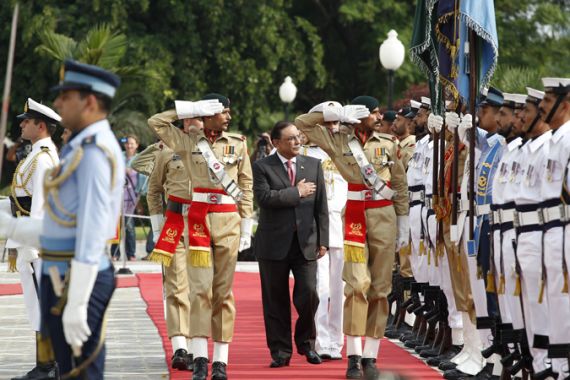Pakistan’s Zardari steps down as term ends
Asif Ali Zardari becomes first democratically elected president in country’s history to complete his term in office.

Pakistani President Asif Ali Zardari has stepped down at the end of his five-year term, becoming the first democratically elected president in the country’s history to complete his full term in office.
At a ceremony at the presidency shown live on state television on Sunday, an honour guard bid farewell to a smiling Zardari. His successor, Mamnoon Hussain, was scheduled to be sworn in on Monday.
Zardari rose to power after the assassination of his wife, two-time Prime Minister Benazir Bhutto, in a gun and bomb attack in December 2007.
Analysts count his government’s completion of a full term in a hostile political environment to his credit, as well as his strong stance against armed groups.
But economic mismanagement and a failure to tackle the country’s energy crisis hurt Zardari’s popularity, they say.
In an interview with local channel Geo TV to be aired on Monday, Zardari talked about “lost opportunities” and admitted that the economy could have been better managed.
He said: “More work could have been done.”
Contentious figure
Zardari said he took pride in the rewriting and amendments made to the country’s constitution which was changed over the years by various military rulers.
He has been a contentious figure as president and has often battled with both the powerful army and the Supreme Court.
His other major accomplishments include transferring power in democratic elections in a country plagued by military coups.
Pakistani army leaders ruled for most of the country’s 66-year history.
He also agreed to a constitutional amendment that transferred many of the president’s powers to the prime minister, leaving his position as largely ceremonial.
But Zardari’s government is widely perceived to have done little to address the major problems facing the country, especially the pervasive electricity shortages that crippled Pakistan’s economy and left some people without power for up to 20 hours per day.
The army launched major operations against the Pakistani Taliban during Zardari’s tenure, but the rebel group has proved resilient and continues to stage frequent attacks against security personnel and civilians.
The newly-elected Nawaz Sharif’s government, however, has stated a policy of holding unconditional peace negotiations with the Pakistani Taliban.
Zardari made it clear in the interview that he did not have any desire to hold any other government office in future.
He said the presidency should be the ultimate position for any politician and that he would like to help his party after it lost badly in the May elections.
“In my opinion, building the party is a bigger job,” he said.